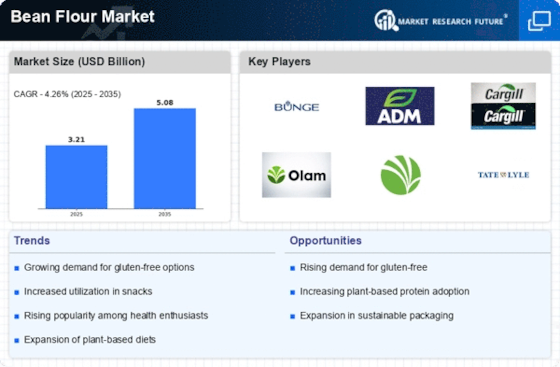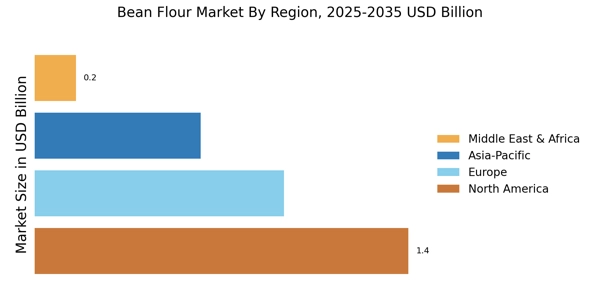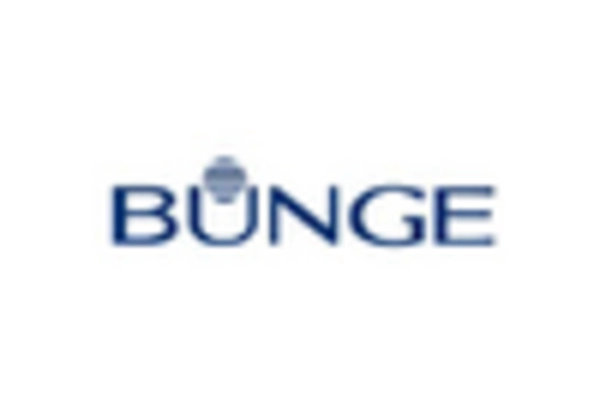Cultural and Culinary Trends
The bean flour Market is significantly shaped by the increasing interest in diverse culinary traditions. As globalization continues to influence food preferences, consumers are exploring various cuisines that incorporate bean flour, such as Asian and Latin American dishes. This cultural shift is driving the demand for bean flour as a key ingredient in traditional recipes, thereby expanding its market reach. Furthermore, the rise of food blogs and social media platforms has facilitated the sharing of recipes that highlight bean flour, further enhancing its visibility. As culinary trends evolve, the bean flour market is likely to benefit from this growing interest in international flavors and cooking techniques.
Innovations in Food Products
The Bean Flour Market is witnessing a wave of innovation as food manufacturers explore new applications for bean flour. This trend includes the development of ready-to-eat meals, snacks, and baked goods that incorporate bean flour as a primary ingredient. The versatility of bean flour allows it to be used in various culinary creations, appealing to a broad consumer base. Moreover, the introduction of bean flour-based products is expected to contribute to the expansion of the market, with projections indicating a compound annual growth rate of around 5% over the next few years. As manufacturers continue to innovate and diversify their product offerings, the bean flour market is likely to experience sustained growth.
Nutritional Benefits of Bean Flour
The Bean Flour Market is bolstered by the increasing recognition of the nutritional advantages associated with bean flour. Rich in protein, fiber, and essential vitamins, bean flour is gaining traction among health enthusiasts and nutritionists alike. For instance, it contains higher protein content compared to traditional wheat flour, making it a favorable choice for those seeking plant-based protein sources. Additionally, the fiber content in bean flour aids in digestion and promotes satiety, aligning with the growing trend of healthful eating. As consumers become more informed about the benefits of incorporating legumes into their diets, the demand for bean flour is likely to rise, further solidifying its position in the market.
Sustainability and Ethical Sourcing
The Bean Flour Market is increasingly influenced by the growing emphasis on sustainability and ethical sourcing practices. Consumers are becoming more aware of the environmental impact of their food choices, leading to a preference for products that are sustainably sourced. Bean flour, derived from legumes, is often associated with lower carbon footprints compared to other flour sources. This aligns with the broader trend of plant-based diets, which are perceived as more environmentally friendly. As consumers prioritize sustainability in their purchasing decisions, the demand for bean flour is expected to rise, encouraging manufacturers to adopt more sustainable practices in their production processes.
Rising Demand for Gluten-Free Products
The Bean Flour Market is experiencing a notable increase in demand for gluten-free alternatives. As consumers become more health-conscious, the preference for gluten-free products has surged, with the gluten-free food market projected to reach approximately 7 billion USD by 2025. This trend is particularly significant among individuals with celiac disease or gluten sensitivity, who are actively seeking safe and nutritious options. Bean flour, being naturally gluten-free, serves as an ideal substitute in various recipes, thereby enhancing its appeal. The growing awareness of gluten-related disorders and the desire for healthier eating habits are driving this demand, positioning bean flour as a key player in the gluten-free segment of the food industry.

















